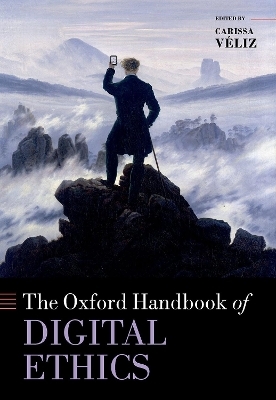
Oxford Handbook of Digital Ethics
Oxford University Press (Verlag)
978-0-19-885781-5 (ISBN)
The Oxford Handbook of Digital Ethics offers a lively, authoritative, up-to-date exploration of pressing ethical issues in our digital world. An international team of philosophers, some pioneers of digital ethics, others experts in related areas of philosophy, give critical appraisals of research in the this fast-growing field and locate it in the broader philosophical context. They push the discipline forward by exploring novel approaches and arguments that will shape the agenda on digital ethics for years to come. The Handbook gives readers tools to better understand problems which face us now in our digital lives, and which are likely to emerge in the future.
Carissa Véliz is Associate Professor in Philosophy at the Institute for Ethics in AI, and a Fellow at Hertford College at the University of Oxford. She has been a witness to the House of Lords Communications and Digital Select Committee, as well as to the Joint Committee on the Draft Online Safety Bill. She was part of the Group of Experts consulted for the drafting a Digital Rights Charter at the Spanish Ministry of Economic Affairs and Digital Transformation. She is the recipient of the 2021 Herbert A. Simon Award for Outstanding Research in Computing and Philosophy. She is the author of Privacy Is Power, an Economist book of the year.
1: Vincent Muller: History of Digital Ethics
2: Shannon Vallor: Virtues in the Digital Age
3: Sven Nyholm: The Ethics of Human-Robot Interaction and the Traditional Moral Theories
4: Rowan Cruft: Is There a Right to Internet Access?
5: Emily Sullivan and Mark Alfano: A Normative Framework for Online Information Sharing
6: Neil Levy: Fake News: Rebuilding the Epistemic Landscape
7: Rebecca Roache: Whats Wrong With Trolling?
8: Krista K. Thomason: The Risks of Online Shaming
9: Holly Lawford-Smith and Jessica Megarry: Is There Collective Responsibility for Misogyny Perpetrated on Social Media?
10: Jeffrey Howard: Extreme Speech, Democratic Deliberation, and Social Media
11: Dean Cocking: Friendship Online
12: Lily Frank and Michal Klincewicz: Sliding into your DMs: The New Wrongs and Rights of Digital Sex and Love
13: Brian Earp and Aksel Sterri: The Ethics of Sex Robots
14: John Danaher: The Ethics of Virtual Sexual Assault
15: James Williams: Ethical Dimensions of Persuasive Technology
16: Robert Sparrow: How Robots Have Politics
17: Elizabeth O'Neill, Michal Klincewicz, and Michiel Kemmer: Ethical Issues with Artificial Ethics Assistants
18: Iason Gabriel and Vafa Ghazavi: The Challenge of Value Alignment: from Fairer Algorithms to AI Safety
19: Marcello Ienca and Effy Vayena: Digital Nudging: Exploring the Ethical Boundaries
20: Brent Mittelstadt: Interpretability and Transparency in Artificial Intelligence
21: Lisa Herzog: Algorithmic Bias and Access to Opportunities
22: Kat Hadjimatheou and Christopher Nathan: The Ethics of Predictive Policing
23: Thomas Douglas: (When) Is Adblocking Wrong?
24: Kasper Lippert-Rasmussen and Lauritz Aastrup Munch: Price Discrimination in the Digital Age
25: Abhishek Mishra, Julian Savulescu, and Alberto Giubilini: Ethics of Medical AI
26: Laura Specker Sullivan: Health and Digital Technology Partnerships: Too Close for Comfort?
27: Geoff Keeling and Rune Nyrup: Explainable Machine Learning, Patient Autonomy, and Clinical Reasoning
28: Kevin Macnish and Jeroen van der Ham: Ethical Approaches to Cybersecurity
29: Michael Robillard: The Ethics of Weaponized Artificial Intelligence
30: Carissa Véliz: The Ethics of Surveillance in the Digital Age
31: Andrei Marmor: Privacy in Social Media
32: Evan Selinger and Brenda Leong: The Ethics of Facial Recognition Technology
33: Johannes Himmelreich: Should We Automate Democracy?
34: Rob Simpson: The Ethics of Quitting Social Media
35: Francesca Minerva: The Ethics of Brain Uploading
36: Karina Vold and Daniel Harris: Does Artificial Intelligence Pose an Existential Risk?
37: John Danaher: The Future of Jobs
| Erscheinungsdatum | 14.12.2023 |
|---|---|
| Reihe/Serie | Oxford Handbooks |
| Verlagsort | Oxford |
| Sprache | englisch |
| Maße | 180 x 253 mm |
| Gewicht | 2 g |
| Themenwelt | Geisteswissenschaften ► Philosophie ► Ethik |
| Informatik ► Theorie / Studium ► Künstliche Intelligenz / Robotik | |
| ISBN-10 | 0-19-885781-0 / 0198857810 |
| ISBN-13 | 978-0-19-885781-5 / 9780198857815 |
| Zustand | Neuware |
| Informationen gemäß Produktsicherheitsverordnung (GPSR) | |
| Haben Sie eine Frage zum Produkt? |
aus dem Bereich


